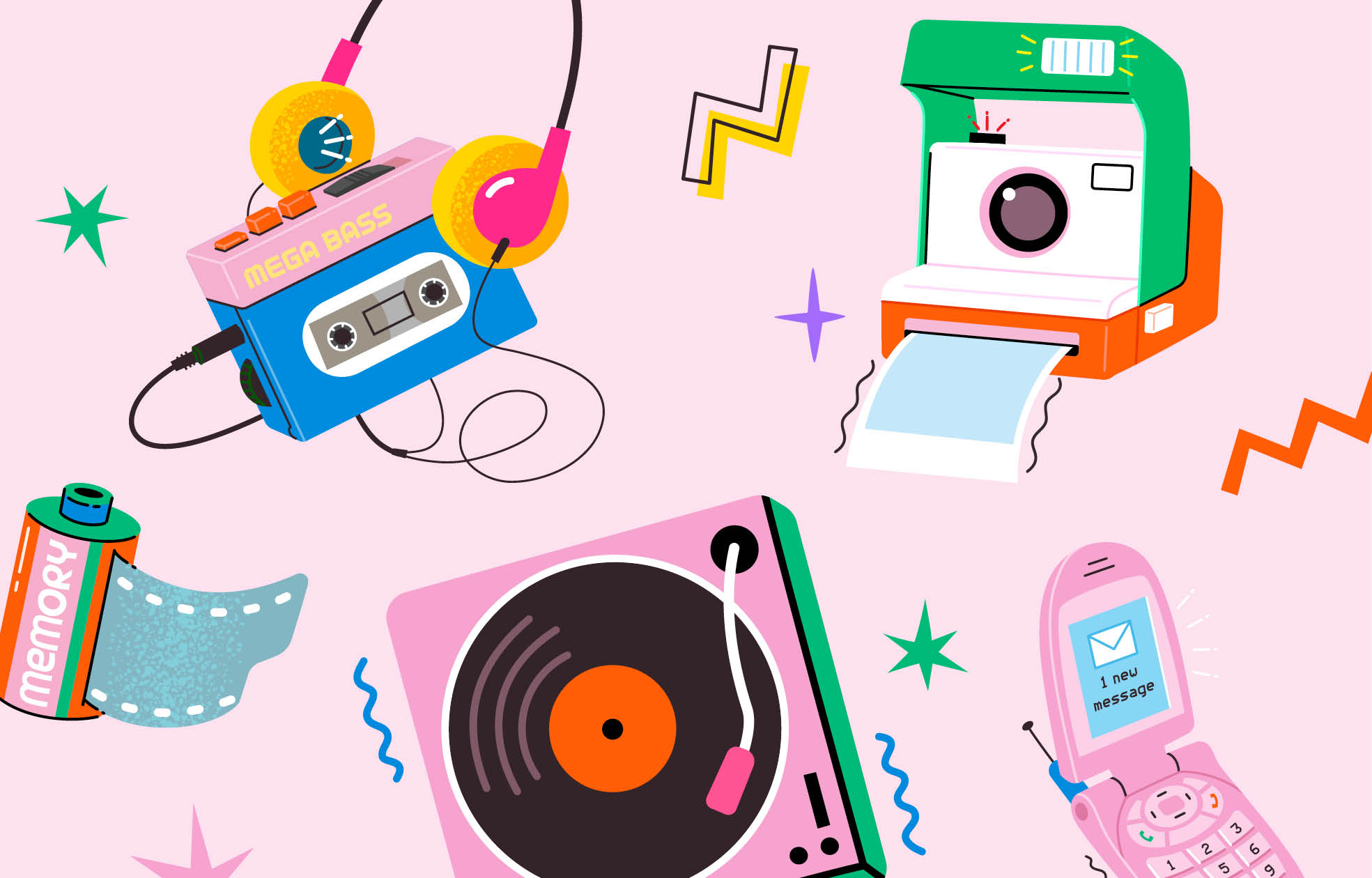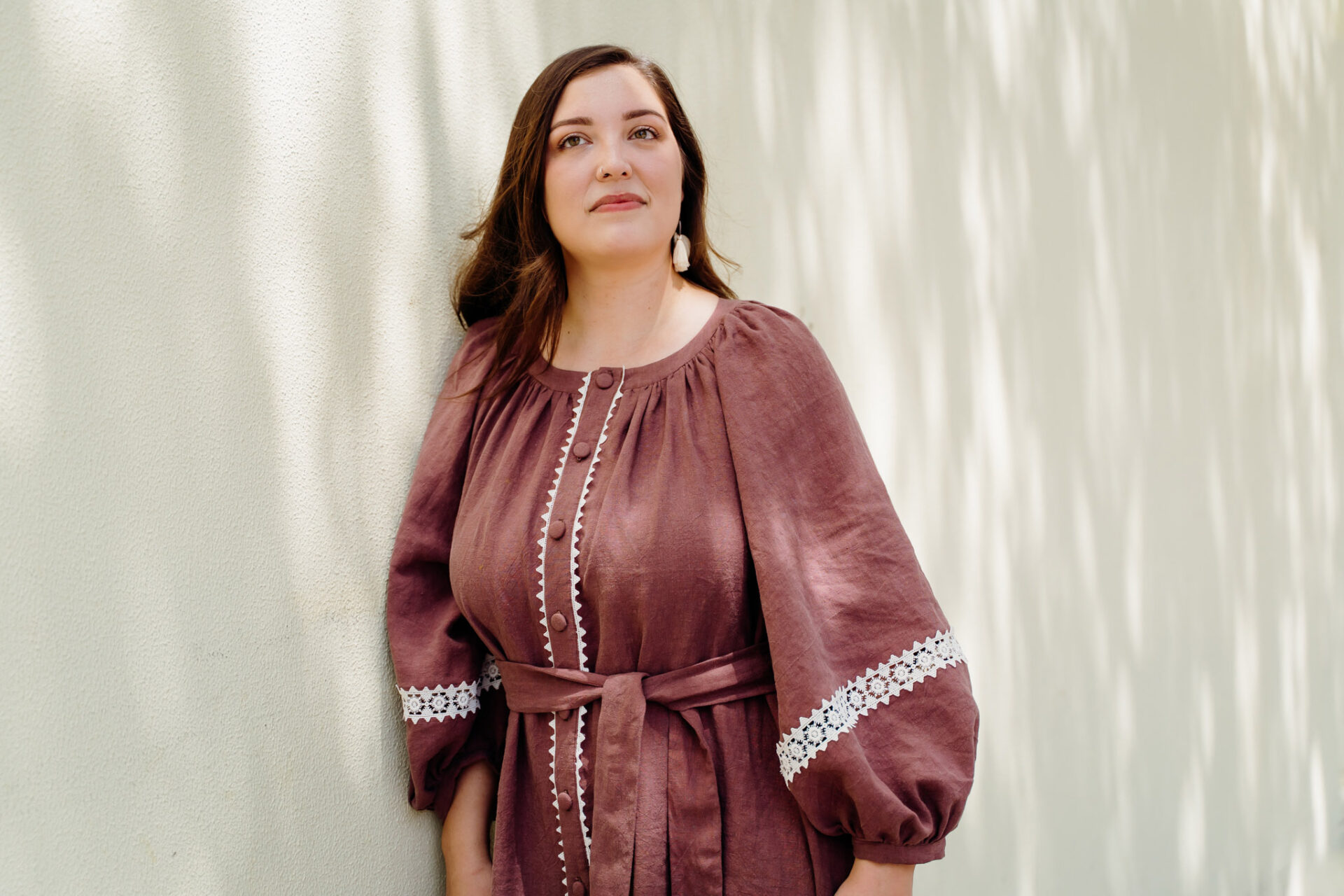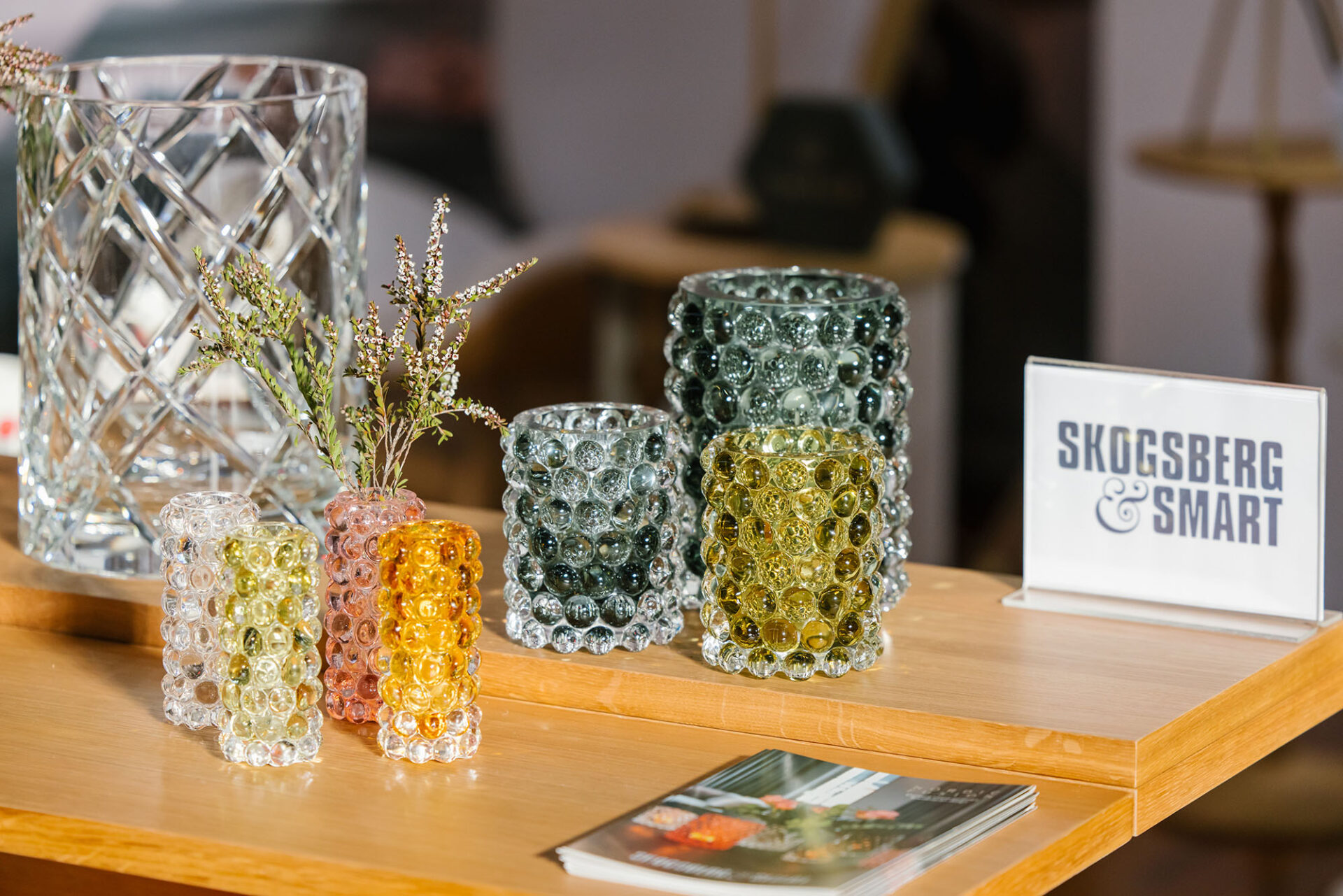The Good Life: The Thrifter Who Created Her Own (Brilliant!) Thrift Shop
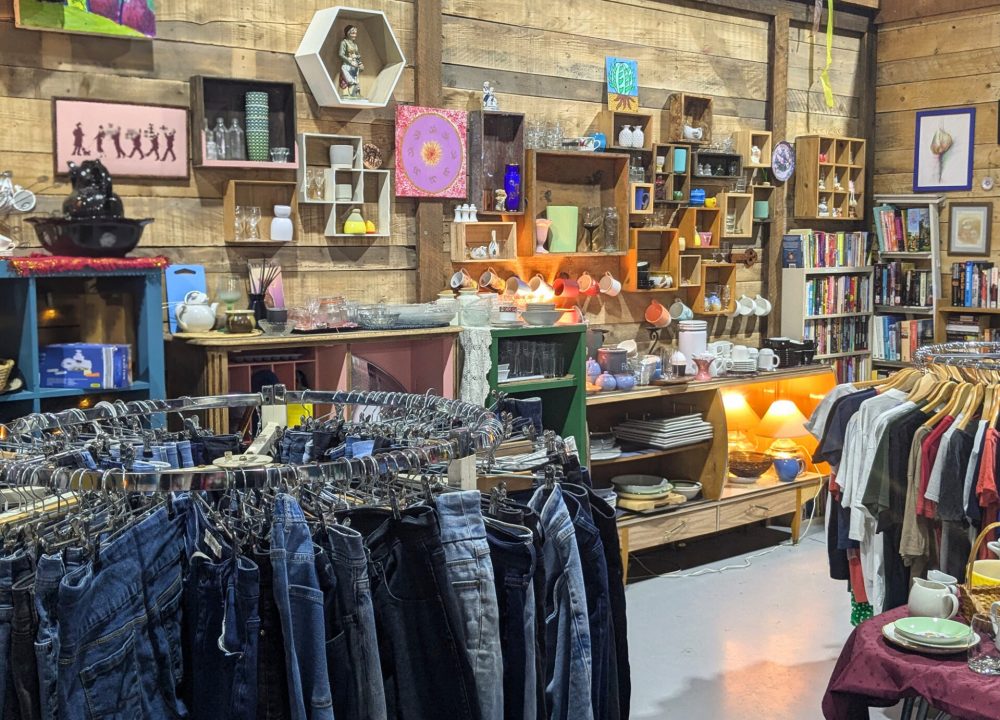
- Words by Peppermint
In honour of Second Hand September, we caught up with Castlemaine’s Tiffany Inglis to talk trends, upcycling and the challenges of running a business.
BY PHOEBE HARTLEY
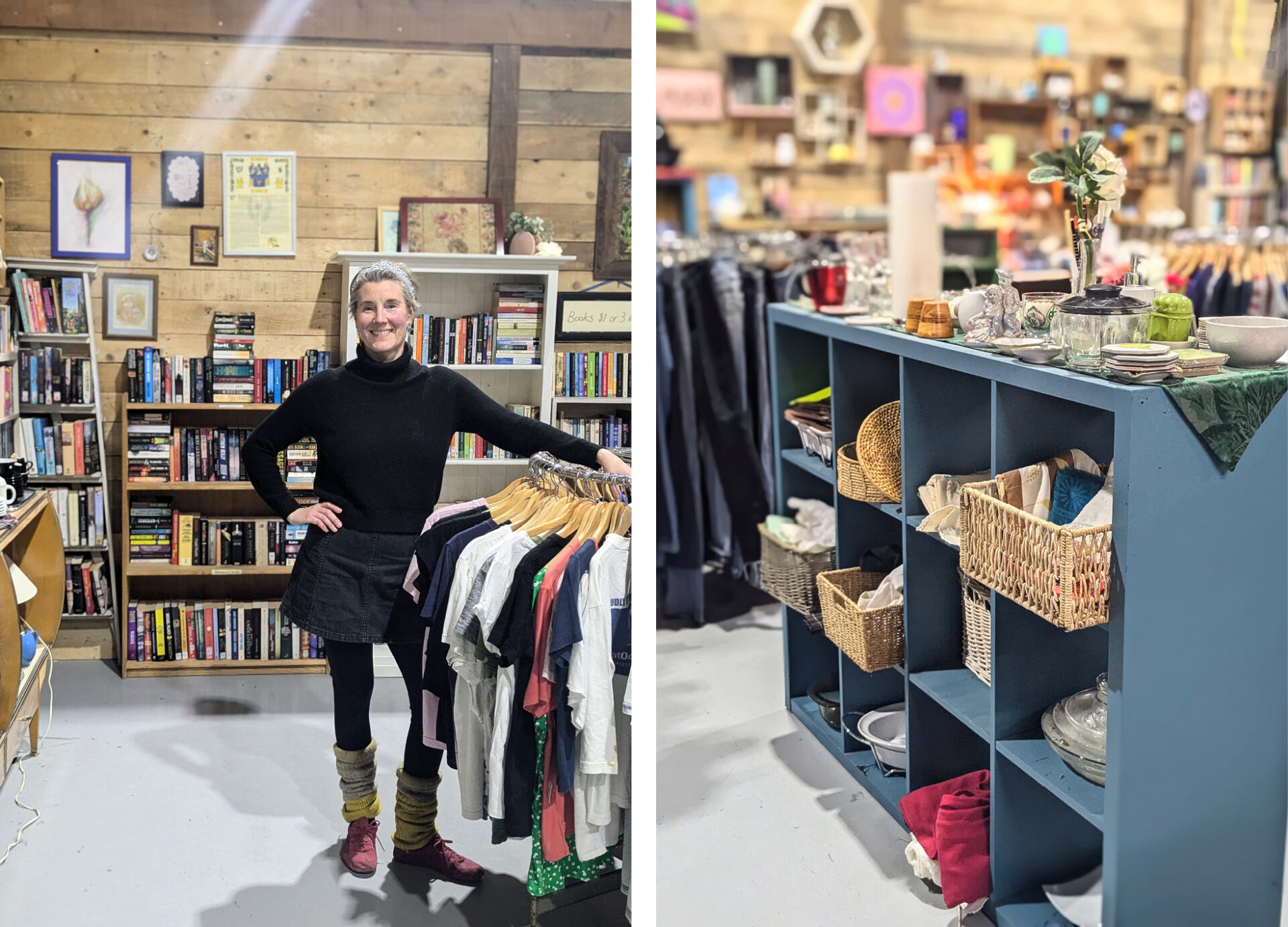
Tiffany Inglis lives and breathes second-hand stuff. As the founder of The Good Op Shop in Victoria’s Castlemaine, about 120 kilometres northwest of Melbourne, she’s on a mission to mend, make, reduce and reuse as much as possible.
“I’ve become more and more passionate about reuse and waste since opening The Good Op Shop,” she says. “My interest has really expanded, especially to textiles.” While she laments the rise of fast fashion, she believes thrifting is also growing in popularity. “I feel like sustainable fashion and buying secondhand is more than just a fad – it’s definitely becoming a part of our lifestyle”.
With a background in government environmental policy, Tiffany has always been eco-minded. When her partner poked fun at her op-shopping habit by suggesting she may as well open one herself, the seed of an idea was planted. She launched The Good Op Shop in 2021 and decided to donate the profits to conservation organisations including Landcare groups, the Bob Brown Foundation and Aussie Ark.
Tiffany thought a purpose-led store would be the perfect outlet to share her passion with the wider community. And she’s been thrilled by the response. “One of the biggest surprises for me is people’s genuine appreciation for op shops and for what we’re trying to do in terms of changing behaviour and promoting reuse,” she says.
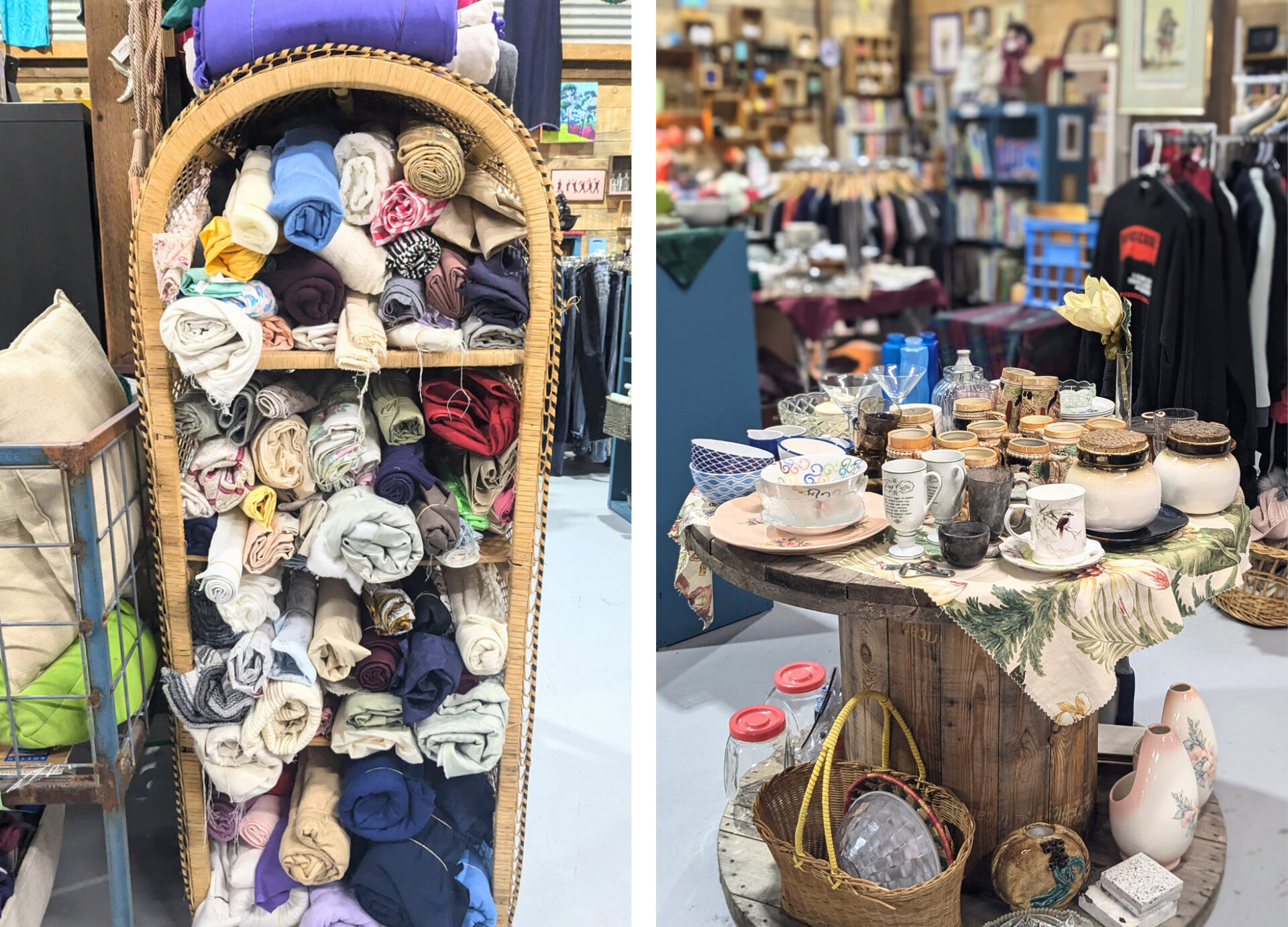
She credits her staff with the store’s success. “I’m so lucky I have incredible volunteers that come in week after week – they really want to help people change,” she says. “I feel like the shop’s not mine, it’s theirs.”
In addition to the store, Tiffany also runs a popular fashion parade for under 18s. Participants are given a voucher for the op shop and are encouraged to create an eye-catching outfit then “strut their stuff down the catwalk”. She also hosts an annual upcycling competition that has artists and amateurs creating works from objects destined for landfill. Last year’s winning creation was an eccentric owl-shaped doorstop, fashioned from a broken blender. “I love that people come up with these wacky ideas,” she says with a laugh.
Buying is such a rewarding experience for people. It makes you feel good and you get a reward at the end of it. So, trying to change that is a massive challenge.”
As if that wasn’t enough, Tiffany has also begun a speaker series at the local library, where a passionate panel recently spoke about second-hand fashion and Tiffany discussed the provenance of different types of fabric. “There’s so much talk about how bad polyester is or how bad acrylic is and how we should be using different fibres, but I realised that I didn’t really know anything about these fibres,” she says. “So I made myself learn about different textiles and then shared that with people.”
Tiffany has also nabbed a community grant to support the store’s regular reuse and repair workshops, which involve everything from scrap sewing and darning to weaving bowls out of plastic bread bags (for details, check out the store’s Instagram page).
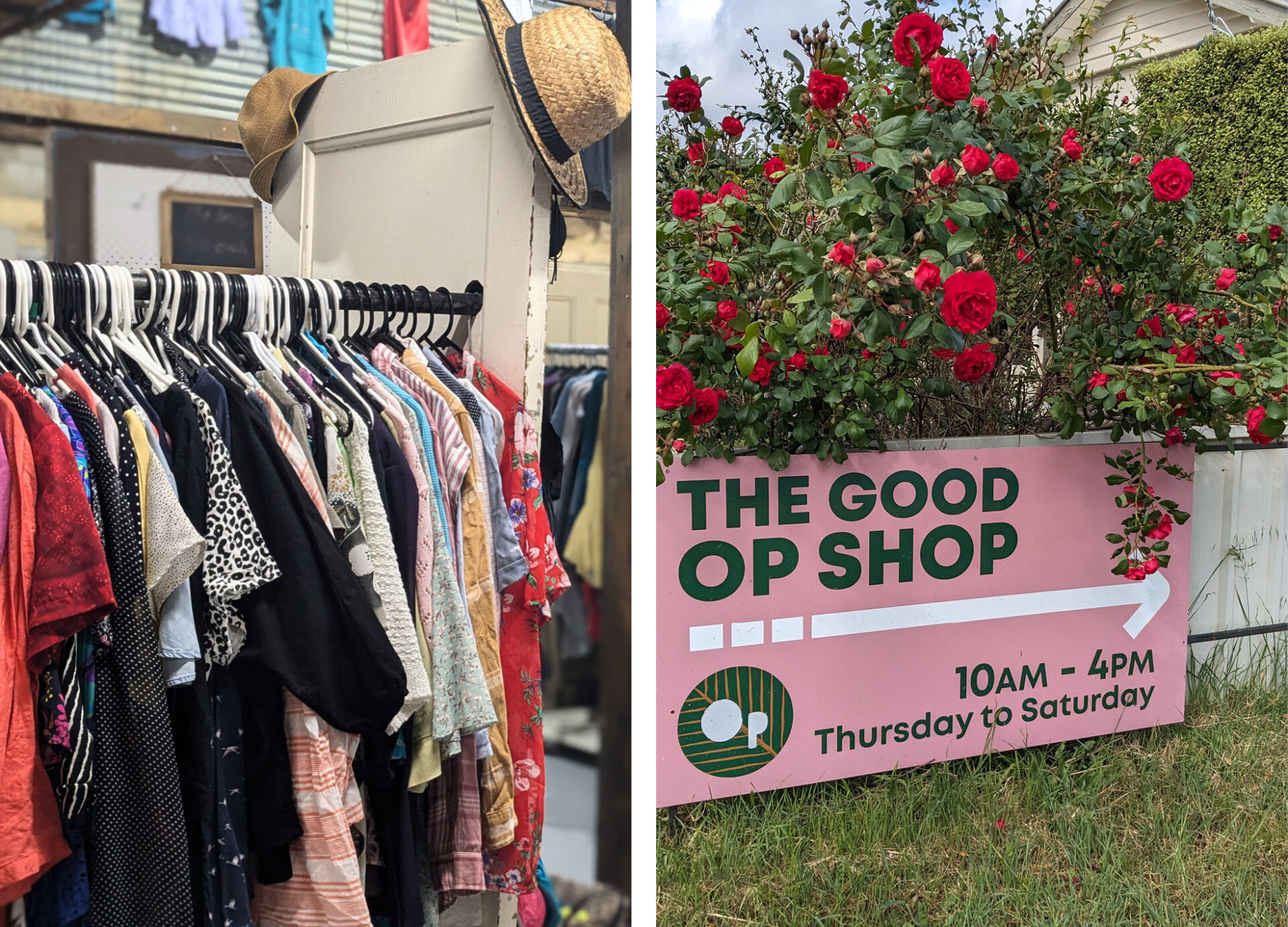
While her passion appears boundless, Tiffany admits there have been hiccups along the way, especially in the early days of the op shop. “I’d never run a business before, so all of it was a challenge,” she says. Tackling the sheer volume of donations is a constant battle and without storage space, Tiffany often has to turn away goods. “Sometimes I have to put a sign out saying ‘Sorry, we’re at capacity’.”
With ambitious ideas constantly brewing, she says she’s also had to learn to be realistic about what she can achieve. “It’s a small business and we’ve only got so many volunteers,” she says.
But the biggest hurdle is changing people’s behaviour when it comes to consumption. “Buying is such a rewarding experience for people,” Tiffany says. “It’s something people love doing: it makes you feel good and you get a reward at the end of it. So, trying to change that is a massive challenge.”
But she has an optimistic outlook and believes people want to do better. “I would love to convert the whole world to second-hand, especially clothing,” she says. “I think reuse is a societal change. It’s an exciting time – I think it’s going to happen soon.”
JOIN OUR MAILING LIST
Brighten up your inbox with our not-too-frequent emails featuring Peppermint-related news, events, competitions and more!
explore
More articles
Look, I don’t want to make anyone panic but IT’S DECEMBER!!! If you’re planning to give homemade gifts, you’re going to have to act fast. …
Hang out with us on Instagram
🌻 The Paddington 🌻
This is a much-loved staple, created for Issue 50 in 2021. We love seeing the #PeppermintPaddingtonTop continually popping up in our feeds!
How stunning is our model Elon MelaninGoddessEfon – she told us it was one of the first times she had been asked to come to a shoot with her natural hair. 🌻
We worked with South African patternmaker Sarah Steenkamp of @FrenchNavyNow_ to create this wardrobe essential – the perfect puff-sleeve blouse. Raglan sleeves make it the ultimate beginner sew, plus the gorgeous back buttons let you add your own personal twist.
Pattern via the link in bio! 🪡
Photos: @KelleySheenan
Fabric: @Spoonflower
Model: MelaninGoddessEfon

“In the 1940’s, Norwegians made and wore red pointed hats with a tassel as a form of visual protest against Nazi occupation of their country. Within two years, the Nazis made these protest hats illegal and punishable by law to wear, make, or distribute. As purveyors of traditional craft, we felt it appropriate to revisit this design.”
Crafters have often been at the heart of many protest movements, often serving as a powerful means of political expression. @NeedleAndSkein, a yarn store in Minnesota, are helping to mobilise the craftivists of the world with a ‘Melt The Ice’ knitting pattern created by @Yarn_Cult (with a crochet pattern too), as a way of peaceful protest.
The proceeds from the $5 pattern will go to local immigrant aid organisations – or you can donate without buying the pattern.
Raise those needles, folks – art and craft can change the world. 🧶
Link in bio for the pattern.
Images: @Gather_Fiber @NeedleAndSkein @a2ina2 @KyraGiggles Sandi.204 @WhatTracyMakes AllieKnitsAway Auntabwi2
#MeltTheIce #Craftivism #Knitting #CraftForChange

TWO WEEKS TO GO! 🤩
"The most important shift is moving from volume-led buying to value-led curation – choosing fewer, better products with strong ethics, considered production and meaningful stories. Retailers have real influence here: what you buy signals what you stand for. At Life Instyle, this means using the event to discover and invest in small-scale, planet-considerate brands that align with your values and your customer’s conscience. Consumers don’t need more things; they need better things, and retailers play a key role in selecting, contextualising, and championing why those products matter."
Only two more weeks until @Life_Instyle – Australia`s leading boutique retail trade show. If you own a store, don`t miss this event! Connect with designers, source exquisite – and mindful – products, and see firsthand why this is Australia’s go-to trade show for creatives and retailers alike. And it`s free! ✨️
Life Instyle – Sydney/Eora Country
14-17 February 2026
ICC, Darling Harbour
Photos: @Samsette
#LifeInstyle #SustainableShopping #SustainableShop #RetailTradeEvent

Calling all sewists! 📞
Have you made the Peppermint Waratah Wrap Dress yet? Call *1800 I NEED THIS NOW to get making!
This gorgeous green number was modelled (and made) by the fabulous Lisa of @Tricky.Pockets 🙌🏼
If you need a nudge, @ePrintOnline are offering Peppermint sewists a huge 🌟 30% off ALL A0 printing 🌟 when you purchase the Special Release Waratah Wrap Dress pattern – how generous is that?!
Head to the link in bio now 📞
*Not a real number in case that wasn`t clear 😂
#PeppermintWaratahWrapDress #PeppermintPatterns #SewingPattern #WrapDress #WrapDressPattern

8 Things to Know About January 26 - from @ClothingTheGaps:
Before you celebrate, take the time to learn the truth. January 26 is not a day of unity it’s a Day of Mourning and Survival for Aboriginal and Torres Strait Islander peoples.
It marks the beginning of invasion, dispossession, and ongoing colonial violence. It’s time for truth-telling, not whitewashed history.
Stand in solidarity. Learn. Reflect. Act.
✊🏽 Blog written by Yorta Yorta woman Taneshia Atkinson.
🔗 Link in bio of @ClothingTheGaps to read the full blog
#ChangeTheDate #InvasionDay #SurvivalDay #AlwaysWasAlwaysWillBe #ClothingTheGaps

As the world careens towards AI seeping into our feeds, finds and even friend-zones, it`s becoming increasingly hard to ignore.
We just wanted to say that here at Peppermint, we are choosing to not print or publish AI-generated art, photos, words, videos or content.
Merriam-Webster’s human editors chose `slop` as the 2025 Word of the Year – they define it as “digital content of low quality that is produced usually in quantity by means of artificial intelligence.” The problem is, as AI increases in quality, it`s becoming more and more difficult to ascertain what`s real and what`s not.
Let`s be clear here, AI absolutely has its place in science, in climate modelling, in medical breakthroughs, in many places... but not in replacing the work of artists, writers and creatives.
Can we guarantee that everything we publish is AI-free? Honestly, not really. We know we are not using it to create content, but we are also relying on the artists, makers and contributors we work with, as well as our advertisers, to supply imagery, artwork or words created by humans. AI features are also creeping into programs and apps too, making it difficult to navigate. But we will do our best to avoid it and make a stand for the artists and creatives who have had their work stolen and used to train AI machines, and those who are now losing work as they are replaced by this energy-sapping, environment-destroying magic wand.
Could using it help our productivity and bottom line? Sure. And as a small business in a difficult landscape, that`s a hard one to turn down. We know other publishers who use AI to write stories, create recipes, produce photo shoots... but this one is important to us.
`Touch grass` was also a Merriam-Webster Word of the Year. We`ll happily stick with that as a theme, thanks very much. 🌿








